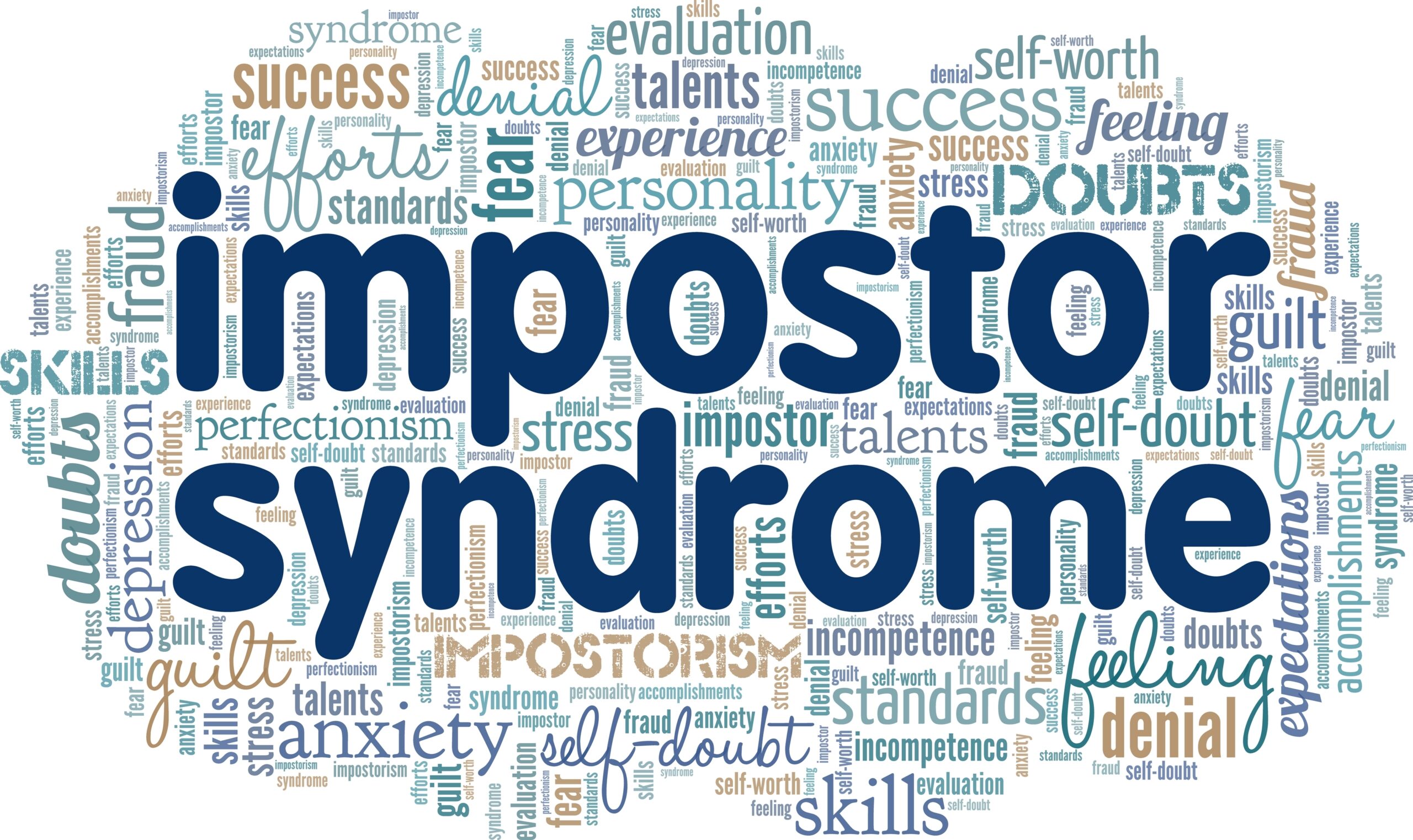


I was 22 when I first became a manager. I remember some of my early thoughts – “Wow, I’m so lucky.” and “I can’t believe they think I’m ready.” These insecurities seemed normal, the product of being so young. But then at 28, and then again at 33, I was still questioning myself, my abilities, and my competency in leadership roles.
I recall several career transitions where I didn’t believe I was qualified for a new position or thought that the decision maker placing me in charge had made a mistake. There were many times where I attributed my successes to luck and chance rather than my own effort. A little voice inside me would say “you will soon be exposed and they will figure out you aren’t as great as they think you are.”
I was wrong. The little voice inside was sabotaging me, lying to me. I was qualified, experienced, and capable. With each higher step in the career ladder, I proved that voice wrong.
Only in recent years have I come to realize that throughout the course of my career, I was battling the “Imposter Syndrome.”
Defining Imposter Syndrome
I first learned of Imposter Syndrome through reading Sheryl Sandberg’s book Lean In. While there are psychologists who qualify it as a diagnosis or illness, this term has come out of the therapist’s office and into the workplace. The alternate definition of Imposter Syndrome is described as feelings and behaviors that may include the following:
● Self-doubt
● Feeling worthless
● Feelings of inadequacy
● Fear to be exposed as a “fraud”
● Self-sabotage
● Excessive humility
● Constant fear of exposure, isolation, and rejection
Essentially an “imposter” believes that they are not the qualified, accomplished, competent individual that others say they are.
It can be brought on through various factors: a negative work environment, burnout, or unsupportive colleagues. But most often, I have found that it comes from a place of insecurity. The lack of self-confidence feeds a fundamental belief in a person’s perceived inadequacy. It translates into a rejection of accolades, or advancements, and can result in the belief that the person’s success is a result of other factors instead of what they themselves have contributed to the situation.
Strategies to Overcome Feeling Like an Imposter
Have you ever felt like your accomplishments were not your own, and resulted from luck rather than skill? Can you relate to some of the feelings as described above? Consider the below strategies to overcome the negative feelings of fear and doubt.
1) Track Your Achievements
Feelings of Imposter Syndrome may come from a lack of clarity or understanding about why an achievement occurred. For example: Why did I get that special award? Why was I asked to lead this committee? Why am I getting this promotion?
If you are not accustomed to spending time thinking about your successes or even speaking to them, they can be so easily forgotten. That’s where tracking achievements is so critical in helping to avoid feelings of being a fake or a phony. Try the following:
● Every time you have an achievement that is resume worthy, document it.
● Tell a family member or a friend about your accomplishments. When you need a boost, they can say it back to you.
● Create a brag book full of collections of reference letters, performance evaluations, and emails with praise.
● Try out apps such as Trello where you can create a career history and achievement tracker.
When you are having a moment of negative self-talk, look to the above strategies and convert your thoughts and feelings into positive ones!
2) Create Your Own Value Proposition
A value proposition is a statement about who you are and how great you are at what you do. Also called a personal elevator pitch, it helps others understand your uniqueness and what makes you special. Try this:
Create a statement that is no more than 1-3 sentences. Explain what you do and what value it brings to your field (for some more tips, click here).
Here’s an example of mine:
“As a strengths’ based certified coach, I work with healthcare professionals on leadership development and career transitions. With my 20+ years of executive experience in healthcare and academia, I support my clients to RISE beyond their potential by increasing Resilience, creating Impact, achieving Success, and delivering Excellence.”
Going through the exercise of creating one, even if you do not have plans to use it, helps with gaining more self-awareness of your own greatness.
3) Get Support from Mentors
A mentor is an experienced and trusted advisor that helps provide guidance, motivation, and support. They are typically someone that is in an allied field, and has been in a similar position, as the person they are mentoring.
Identify who plays these roles for you. To find a good mentor, try to reach out to someone you admire and respect and who serves as a role model for you. They can be internal to your organization, or external to it. Consider reaching out to individuals in your network such as through associations or societies you may be a member of.
Talk to them about what you are feeling and get their support. A strong mentor can help you understand how your accomplishments are the result of who you are and what you do vs. what anyone has done for you.
4) Build Self-Confidence by Supporting Others
Sometimes it’s easier for us to come up with solutions for others rather than realize them for ourselves. But, the more you hear yourself guiding someone else in need, the more likely you are to listen to some of your own advice. So, the more you help others, the better you feel about yourself.
Consequently, the more you hear from others about their own imposter-like feelings, the more you will see how those same feelings may manifest in yourself. This awareness can help uncover what you can do to overcome them. Try becoming a mentor for someone else in need!
5) Hire a Coach
An executive coach is a qualified professional who helps support leaders to unlock their potential, create more self-awareness, increase emotional intelligence, and be a sounding board. They also act as a thought partner that, through a process of self-exploration, can help you identify your triggers of Imposter Syndrome and how to minimize the negative thoughts. An executive coach is also an thought partner and can work with you on setting goals and working towards them in order to strengthen self-confidence.
While you may have doubts of contracting with a coach, remember that it’s an investment in yourself, your career, and your professional development. Hiring a coach helps to streamline the process of overcoming the Imposter Syndrome and helps you obtain what you want sooner through an individualized approach. Once you establish an effective relationship with a coach, rising above the negativity and imposter-like feelings becomes commonplace and easier.
In summary, I have had moments throughout my career where I felt like an imposter, a fake and a phony, and feared that all I had built and worked hard for was not a result of my hard work and skills. I utilized all the strategies listed above to reaffirm my own value and remind myself that I truly earned every promotion, award, and accolade.
Try some, or all of the strategies above to help lead you to your goals of improving self-confidence and shaking away feelings of being an imposter.
Manage your self-talk to be positive, inspirational, and motivational, and quiet the negative voice in your head. You are the real deal – believe it!
Let’s talk more! Feel free to reach out to me:
Aashi Arora
aashi@iriseexecutivecoaching.com
(916) 292-8862
 Preparing to Step Into CEO Roles
May 30, 2023
Preparing to Step Into CEO Roles
May 30, 2023
 Tackle Imposter Syndrome by Prioritizing This Relationship
May 12, 2023
Tackle Imposter Syndrome by Prioritizing This Relationship
May 12, 2023
 How Do You Know It’s Imposter Syndrome?
Mar 08, 2023
How Do You Know It’s Imposter Syndrome?
Mar 08, 2023
 Imposter Syndrome During a Job Transition
Jan 20, 2023
Imposter Syndrome During a Job Transition
Jan 20, 2023
 4 Strategies for A Successful Interview
Oct 19, 2022
4 Strategies for A Successful Interview
Oct 19, 2022
Please subscribe to receive a pdf of 15 Ways to Tackle Imposter Syndrome
